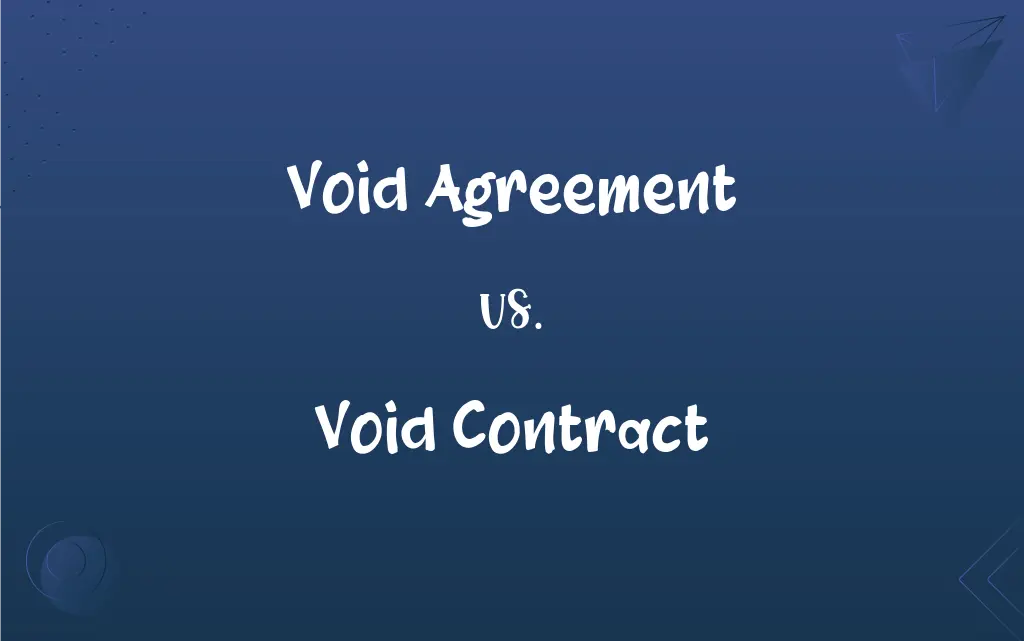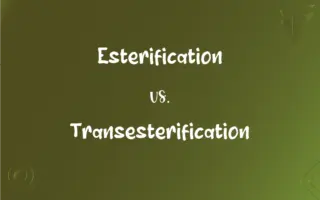Void Agreement vs. Void Contract: What's the Difference?
Edited by Harlon Moss || By Janet White || Updated on November 28, 2023
A void agreement is inherently unenforceable from the start, while a void contract becomes unenforceable due to certain factors.

Key Differences
A void agreement is never legally binding because it lacks essential elements of a valid contract. In contrast, a void contract initially starts as a valid agreement but later becomes unenforceable due to certain developments or changes in law.
Void agreements are void ab initio, meaning they are void from the outset. On the other hand, void contracts may become void due to external factors like a change in the law, making them voidable at a later stage.
In a void agreement, the absence of legal requirements such as mutual consent, lawful consideration, or a lawful object renders it void. Whereas, a void contract may lose its enforceability due to impossibility of performance or illegality arising after the agreement.
Void agreements do not create any legal rights or obligations for the parties involved. Conversely, void contracts may have created legal rights and obligations before they became void.
Remedies or legal consequences are typically not available for void agreements since they are not recognized by law from the beginning. In contrast, void contracts might involve legal consequences or remedies, especially if any obligations were performed before the contract became void.
ADVERTISEMENT
Comparison Chart
Legal Status at Inception
Always legally invalid from the beginning.
Initially valid, becomes invalid due to factors.
Cause of Invalidity
Lack of essential elements of a valid contract.
External factors like change in law or impossibility.
Legal Obligations
Creates no legal obligations.
May create legal obligations before becoming void.
Remedies
No remedies as it is never legal.
Remedies possible for obligations performed prior.
Enforceability
Never enforceable in court.
May have been enforceable before becoming void.
ADVERTISEMENT
Void Agreement and Void Contract Definitions
Void Agreement
A void agreement arises when essential elements of contract are missing.
An agreement without consideration is a void agreement.
Void Contract
A void contract may involve legal consequences before nullification.
Parties to a void contract may seek restitution for prior performance.
Void Agreement
A void agreement is one that violates legal provisions.
An agreement contravening public policy is a void agreement.
Void Contract
A void contract loses its legal enforceability.
A contract becomes void when its terms violate new laws.
Void Agreement
A void agreement lacks enforceability by law.
An agreement with a minor is a void agreement.
Void Contract
A void contract is nullified due to external factors.
A contract becomes void if its subject matter is destroyed.
Void Agreement
A void agreement is an agreement without legal effect.
An agreement to commit a crime is a void agreement.
Void Contract
A void contract is a valid contract that becomes invalid.
A contract becomes void if its performance becomes impossible.
Void Agreement
A void agreement is null from the outset.
An agreement for an impossible act is a void agreement.
Void Contract
A void contract initially creates legal obligations.
A contract valid at signing but voided by a change in law.
FAQs
What causes a void agreement?
Lack of essential elements like mutual consent or lawful object causes a void agreement.
What is a void contract?
A void contract is an agreement that loses its legal enforceability due to certain factors.
Can a void agreement be ratified?
No, a void agreement cannot be ratified as it is invalid from the beginning.
What is a void agreement?
A void agreement is an agreement that is not legally enforceable from its inception.
Can a void contract be ratified?
A void contract cannot be ratified since it has lost its legal validity.
Do void agreements have legal consequences?
Void agreements have no legal consequences as they are null from the outset.
Are void agreements enforceable in court?
Void agreements are not enforceable in court.
Was a void contract ever legally binding?
Yes, a void contract was legally binding before it became void.
Can parties to a void contract seek legal remedies?
Parties to a void contract may seek remedies for obligations performed before it became void.
What happens to a void contract in court?
A void contract is treated as non-existent in court and is unenforceable.
Can a void agreement become valid?
No, a void agreement cannot become valid as it lacks legality from the start.
Can a void contract be enforced in court?
A void contract cannot be enforced in court as it is no longer valid.
Do void contracts have legal consequences?
Void contracts may have legal consequences related to actions taken before they became void.
Is a void agreement legally binding?
No, a void agreement is not legally binding.
Can parties to a void agreement seek legal remedies?
No, parties to a void agreement cannot seek legal remedies.
What causes a contract to become void?
Factors like illegality, impossibility of performance, or changes in law can void a contract.
Can you give an example of a void agreement?
An agreement to perform an illegal act is an example of a void agreement.
Can you give an example of a void contract?
A contract that becomes impossible to perform due to unforeseen events is a void contract.
What happens to a void agreement in court?
A void agreement is disregarded in court as it has no legal standing.
Can a void contract revert to being valid?
No, once a contract becomes void, it cannot revert to being valid.
About Author
Written by
Janet WhiteJanet White has been an esteemed writer and blogger for Difference Wiki. Holding a Master's degree in Science and Medical Journalism from the prestigious Boston University, she has consistently demonstrated her expertise and passion for her field. When she's not immersed in her work, Janet relishes her time exercising, delving into a good book, and cherishing moments with friends and family.
Edited by
Harlon MossHarlon is a seasoned quality moderator and accomplished content writer for Difference Wiki. An alumnus of the prestigious University of California, he earned his degree in Computer Science. Leveraging his academic background, Harlon brings a meticulous and informed perspective to his work, ensuring content accuracy and excellence.






































































